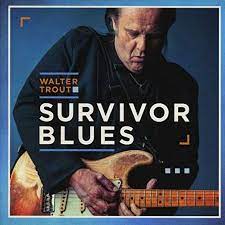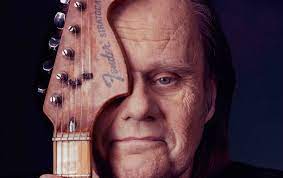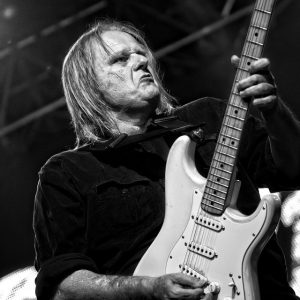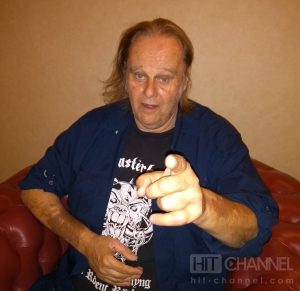HIT CHANNEL EXCLUSIVE INTERVIEW: November 2019. We had the great honour to meet with Walter Trout while on vacation with his wife, Marie, in Greece. He has been a member of John Mayall’s Bluesbreakers and Canned Heat and since 1989 he has a very successful solo career. In early 2019, he released “Survivor Blues”, an album containing covers of lesser-known blues songs. Read below the very interesting things he told us:
 Did you have fun doing the video for Chuck Berry’s “Johnny B. Goode” with Mike Zito?
Did you have fun doing the video for Chuck Berry’s “Johnny B. Goode” with Mike Zito?
Oh, I had a great time doing that. We did it in my house and I had my wife in there and I have one of my sons playing the drums in the video and I have my road manager playing the bass and the girl who handles our social media is in there; she is the keyboard player. Oh, it was great fun! All the neighbours came out and danced and we had food for everybody. It was like a big community project. A lot of fun.
How challenging was it for you to do a summer tour with a broken finger?
That was pretty challenging. You can see it, it’s still puffed up. I still can’t use it. I am hoping it heals soon. It’s been almost four months and it is taking a long time. But some people said to me that I needed to cancel the tour and I went: “No. I still can play. I still have three fingers. So, I ‘ll just use three fingers”. It was a challenge and I enjoyed the challenge. I thought I had to really have a lot of energy and concentration.
How did you come up with the idea to cover lesser-known songs on “Survivor Blues”?
Well, I was riding in my car and there are some blues radio stations in America and I found they kept playing the same songs, over and over. “Got My Mojo Working”, “Stormy Monday”, over and over and all these bands they keep recording those songs, that I thought there are so many great songs that they have not been covered and somebody needs to do that. So, it was a labour of love for me. It was really a lot of fun.
 What was it like to record “Goin’ Down To The River” live in the studio with Robby Krieger (The Doors)?
What was it like to record “Goin’ Down To The River” live in the studio with Robby Krieger (The Doors)?
Oh, that was a lot of fun. I recorded at his studio – he’s a friend of mine- and he has a private studio and the studio is beautiful. He has all of his gold and platinum records on the walls from The Doors and he has photos of him sitting with Jimi Hendrix. It’s a great place. We would record and he would be sitting in there and he’d be playing alone on his guitar and one time I said: “You know, instead of sitting in the control room playing alone, why don’t we go out into the studio unless we record something?” and we did it live. We picked the song and we didn’t really need to rehearse it. We went out and just played it and that’s what you hear: You hear a live version. There are no overdubs, no nothing like that.
In “Survivor Blues” you cover John Mayall’s “Nature’s Disappearing”. Are you surprised that the song is still relevant 49 years after its release?
I think the song is even more relevant, because now we know things that we did not know 49 years ago. For instance, climate change, global warming and pollution. Actually, the world in same ways, is in worse shape than it was 40 years ago. And then, we have people like Donald Trump who is doing everything he can do to make it even worse, so I just thought that the song has more meaning now than it did in 1970.
How spontaneous was the Hendrix flavour in J.B Lenoir’s “God’s Word”?
The original of that song is done acoustic: one man, one guitar. And I brought it into the band and I said: “We are going to take this song and we are going to turn it into Jimi Hendrix” and that’s what we tried to do. I said: “When we are playing this song I want you guys to think “Voodoo Chile””. We only played it once, maybe twice and that’s another one that is live. There are no overdubs. I counted to four and we played it.
 How emotional was it for you to do “Blues for Jimmy T.” on “We’re All In This Together” album, with your mentor John Mayall as a tribute to your late bassist, Jimmy Trapp?
How emotional was it for you to do “Blues for Jimmy T.” on “We’re All In This Together” album, with your mentor John Mayall as a tribute to your late bassist, Jimmy Trapp?
It was very emotional and we did that acoustically, just John and myself. It has taken me a lot of time to be able to write a song for Jimmy, because he was my dearest friend for 30 years and he and I, started my band together. We were in a club band, many-many years ago. When we were very young, we played together in a bar band and we remained best friends. When I started my band, he was the first guy I called: “Jimmy let’s start a band together”. He died young, he was only 52 and he had a heart problem. To play that song for my best friend and to play it with Mr. Mayall who is like a father to me, was very-very emotional and it’s still hard for me to listen to it. I start weeping, I start crying.
The interaction between you and Warren Haynes (Gov’t Mule, Allman Brothers Band) in “The Sky Is Crying” from “We’re All In This Together” is amazing. How did you achieve that result without being in the same room together?
When you have someone who is of the highest caliber, like Warren Haynes, you can close your eyes and you can pretend like you are in the studio together. I sent him the track and he listened to what I did and he answered me, musically. That’s how great of a musician he is: He could do that. I thought that cut came out tremendous. I thought it came out great. It sounds live. I have to say it’s also the way that Eric Corne, my producer, mixed that record too. So, you have these great musicians – all these guys on that record are great musicians- and then you have this great mixer who can make it sound like we were in the same room.
Could you describe to us your feelings when you played your first concert after your liver transplant at the Royal Albert Hall on 15 June 2015?
There were a lot of different emotions that night. I was nervous, I didn’t know what would happen. I didn’t know when I open my mouth to sing, if anything would come out. I didn’t know when I went to play, if I would be able to play and I didn’t know if I would fall over, because for a long time, when I was sick, I had problems with my balance and I couldn’t stand up. So, I have to say, I was very nervous but when I counted to four and the band came in behind me, I thought to myself: “I’ve done this 10.000 times, I’m at home on stage. The stage is my home and I know how to do this” and then I had an incredible experience.
 How important was the period you played with John Mayall’s Bluesbreakers to your later career?
How important was the period you played with John Mayall’s Bluesbreakers to your later career?
If I had not had the chance to play with John Mayall, I don’t know what kind of a career I would have had. Let me go back and say this: If you are a blues guitar player and you are a sideman, to play with John Mayall is the pinnacle of the mountain. It’s Mount Olympus, OK? It’s as high us as you can get in the blues world. Now, you could say: “Yeah, but you could play with BB King”. But with BB King you would not play solos, you would not sing. John Mayall features you, he makes you a star. He presents you to the people. He says: “Here’s Walter Trout” and you sing and you play. He really made my career and after you play with him, you either go solo or you move back down. Where are you gonna go from that? He is the pinnacle. He’s the peak. The only thing to do after five years with Mr. Mayall is to go solo or as I say, you move back down the ladder, not up.
There is a great story about a cassette tape that John Mayall gave you before your first solo tour in Europe. Would you like to share it with us?
Where did you hear that story (laughs)? OK. When I did my first tour of Europe, I was still in his band and he said he was gonna take four months and not tour. So, I thought: “Well, I’ll get some musicians and I’ll go tour Europe” and right before the tour he said to me: “Walter, two weeks into your tour, all your band members, everybody will start to hate each other. You will be in the van and everybody will be pissed off and everybody will hate each other. And when that happens, here’s a tape, I want you to put this tape on”. So, I had that tape and we were touring and two weeks into the tour, we all hated each other. Everybody was pissed off. He was correct and I thought: “Ok, it’s time for the tape”. I unwrapped it and I put it in and it was 45 minutes of him farting. He had walked around for a month with a recorder and he had recorded every fart and he had labeled it: “The Farter of British Blues” and now I put the tape in and within about 5 minutes we were all laughing so much that we all loved each other again.
Do you feel lucky that you got to know BB King?
Oh, of course. To me, BB King is the greatest bluesman in history. I think BB King is up here and everyone else is beneath him. He’s the greatest bluesman that ever lived and to become his friend was one the greatest honours of my life.
 Are you optimistic about the future of the blues?
Are you optimistic about the future of the blues?
I’m very optimistic about it, because there is a large group of young guitar players now who are coming up and who love this music and they are playing this music. Just about every town I go in, somebody comes up and says: “Hey, you got to hear this kid. He’s 14 years old and he’s playing the blues”. They are all over the place and when old guys like me die out, all these young kids are gonna be coming up and keeping this music alive. I think the reason is that there will always be an audience for someone who is playing an instrument and singing from their heart. Even in the face of the corporately controlled computer music that you hear all over the place, there is always gonna be an audience for music that is human and comes from the heart.
When your next album of original material will be released?
I will record it in January, I will give it to the label by the end of February. It will probably come out next summer.
How much impact did The Beatles performance on The Ed Sullivan Show had on you?
It changed my life and it’s hard to explain to someone who is not of my generation. I was 13 and they came on The Ed Sullivan Show and everybody I know watched that show and the next day the world was a different place. I told my parents: “I have to have an electric guitar. I want to be in The Beatles. I’ll never be in The Beatles but that’s what I want to do”. Every kid of my age, we all wanted to be a Beatle. The Beatles when you were 13, they seemed to know a secret that the rest of us didn’t know. They were the coolest guys on the planet. I am a blues musician, but to me The Beatles are still the greatest band that ever was in history.
 Do you think social media like Youtube and Facebook have helped younger listeners to learn about your music?
Do you think social media like Youtube and Facebook have helped younger listeners to learn about your music?
I think they do, but it also has another side to it. We were just upstairs and I found that somebody is impersonating me on Instagram and sending out pornographic messages and telling people that I have broken up with my wife. Now, I don’t know why this person is doing this, but he’s a fucking asshole and I am hoping I can find out who it is. But I do know that the social media, Youtube, Facebook, that’s how you can share your music with people and there are many bands now that don’t need a record label. A saw a lady on television the other night. She is a violin player and she said that she went to 10 different record labels, no-one would sign her up. She started putting her videos on Youtube, she started getting 3-4 million views and now she tours and plays giant arenas. Her name is Lindsey Stirling and no-one would sign her up. She went on Youtube and became a huge star. So, it’s a wonderful venue, a wonderful medium, that you can share your art.
Was there any kind of competition in New Jersey between your first band Wilmont Mews and Bruce Springsteen’s Steel Mill?
Yeah, of course there was. We were bar bands. We all did cover music. We were all 16-17. We played the same night clubs. The band I was in had horn lines and we did Blood, Sweat & Tears and Chicago. We would do Rolling Stones and put the horns in there and we did “Got to Get You into My Life” by The Beatles. Steel Mill was doing a lot of Otis Redding and they were doing Motown and Phil Spector kind of stuff and they were a great band. He was playing lead guitar and I didn’t think he was a very good guitar player and that’s what I told him: “You are not really a good guitar player” and he said to me: “Well, I am writing songs” and I said: “I hope your songs are good” and I guess he showed me, didn’t he?
Tony Williams came from Boston and joined Miles Davis when he was 17 years old. Are there those kinds of opportunities today?
I think there are. I think if you are a young great musician, you can go and audition for people and get into a great musical act playing live. I think though that maybe you need to go to where the music is. I know if somebody, for instance, is a great musician and he is 18 years old and lives somewhere in the middle of… Kansas or Tennessee, he probably has to go to New York or Los Angeles. I went to Los Angeles. I couldn’t get anywhere in New Jersey. I played in a bar. I went to Los Angeles and my life changed. If I had stayed in New Jersey, probably I would still be in a bar.
What was your first impression of Athens?
The city is incredible. I’ve been here for three days now with my wife and we had the best time. It’s just an amazing place and the people are really friendly. We walked all over the city and we’ve climbed to the top of the Acropolis twice. Lots of great food. We are having a wonderful time. We went to Olympia, we went to Delphi and we are now planning on coming back and going up into the mainland. This is what we did: We flew in to Athens and we rented a car and we went to Kalamata. Of course, we had some olives and then we went to Olympia. So, we ‘ve spent a lot of time in Peloponnese and then we drove around. Now, we want to go up north, so I think we will come back and go up north into your mainland.
How much has your life changed after your liver transplant?
Oh, it has changed a lot. Not just my life but my perspective, my view, my outlook on life. When you face death that closely, it changes your idea of what is important and what is not important and you realize the importance, for instance, of family and love. I used to be very concerned with certain things. For example: Why does this guy sell more records than me? And now I don’t give a shit. I realized that what is important is that I live every day. I enjoy my life. I know that my time is limited and I enjoy my wife and my children and my career and the fact that I can still get up and play music to people. Those are the important things.
 Do you like Frank Marino (Mahogany Rush)?
Do you like Frank Marino (Mahogany Rush)?
I love Frank Marino! He’s incredible and his drummer of many years is a good friend of mine, he is one of my neighbours, Dave Goode. He is the drummer with Frank Marino and he is on the new DVD that it has just come out. I know Dave very well. He’s a neighbour of mine in California and I think Frank Marino is one of the greatest guitar players ever.
Would it be possible to have him as a guest in one of your next albums?
I am hoping. I’ve talked to Dave about it, because Dave as I said is his drummer and he is my neighbour and I am hoping we can make that happen, I am.
A huge “THANK YOU” to Mr. Walter Trout for his time and to Mrs. Marie Trout for her valuable help.
Official Walter Trout website: https://www.waltertrout.com/
Official Walter Trout Facebook page: https://www.facebook.com/waltertroutband/

